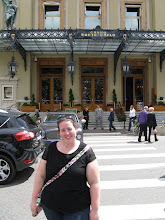Evaluation of Three Definition Engines: "Try"ing to make learning fun
A famous idea put forth by the philosopher Socrates is that it is important not to talk about something without first defining it and having a clear understanding of it. By using three different online reference pages I was able to learn about the three key terms of the course(persona, essay and pastiche); and despite originally thinking I knew how to define the words, I ended up learning a lot more from these sites. While I was able to benefit from all the sites, some were clearly better than others. The three sites that were used in this definition project were the Online Etymological Dictionary, the Oxford English Dictionary, and the Visual Thesaurus.The Online Etymological Dictionary was an interesting resource because it defined words by their history. It was a new experience to learn where the words had their origin and how the words had evolved over time. The resource did have more negative aspects than positive though. Other than its ability to give a history of the word the dictionary was very unexciting and unable to engage my curiosity. Another negative was that the information was not as helpful in truly understanding what the definitions of the words were, as compared to the other two sites. For example, the key word “essay” is simply defined as “a short non fiction literary composition” with little other information.
The Oxford English Dictionary is known as the “definitive record of the English language” (www.oed.com). This reference was very good at its ability to define the words and improve upon what I already knew about the particular words. An example of this would be to use the key word “essay” once again. I knew that it was a literary work but I did not know that it also could be defined as “a trial, to try, an attempt.” There were some aspects about this engine that did not make it the best site of the project’s experience. While the amount of information is acceptable, the way that it is presented is very standard and not engaging at all. The site also gave lengthy definitions and numerous examples that not organized well.
The final online resource that I used was the Visual Thesaurus. The Visual Thesaurus is one of the best reference websites I have ever used. It has the ability to engage the interest of the user in a matter of seconds. It defines the word visually, showing the connections between that word, and words with similar meanings. When learning is fun it makes you want to learn even more. This site was able to peak my curiosity to learn all the connections for the different key terms. Finally, the resource gave me the ability to take the few words that I could associate with the key terms and multiply them in to many different words and gave me the definitions of them. The only problem with this site is that it is simply just a thesaurus with limited definitions so it can be hard if you what you are looking for is a concrete definition for a word. By using “essay” as an example again we can see that the site gives approximately 14 different words that are connected to “essay” and of those 6 have definitions.
Overall, all of the online resources helped aid me in defining the key terms for this class. While some websites were better than others, they all had positive and negative aspects. By doing research using all three you are allowed to cover the entire range of a word, from its origins to its definitions.

